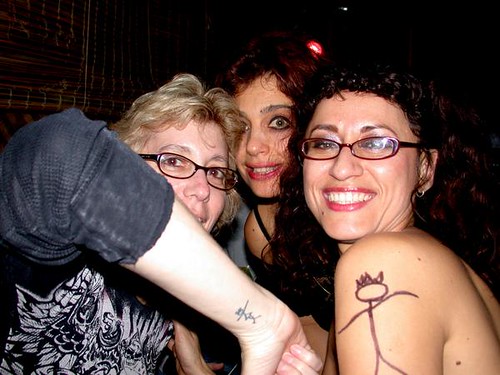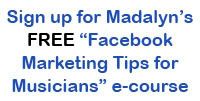by Annette WarnerMarian Call is smart, motivated and besides being talented, also ready to take on this industry with some tenacious stamina. Take a moment to read our interview and learn from her point of view about being a successful rising musician, as well as a bit about her new release "Vanilla" - which besides being my favorite aroma, is also now one of my fave independent CD's. - Enjoy! Annette Warner

What drives your music. When did you first know you had to do this thing called music or bust?
I grew up in a musical family and always studied classical and choral music, but I swore I'd never be a professional musician. After college I stopped participating in music for a couple of years, and realized for the first time that I'd probably spent forty hours per week making music for my whole life. There was a gaping hole there, where rehearsal and performance used to be. So I had to get back into it. At the same time, I discovered singer-songwriters and independent musicians I could really respect, folks like me who were classically educated but wanted to sing in a more soulful style. With those new role models I was able to find my own voice, and "break out" a couple of years after college with a sound that was my own. That's when I knew I had to try to make a life out of this.
What kind of advice would you offer up and coming artists that get discouraged other than don’t give up?1) Learn to be a businesswoman. There are so many great artists out there today, and honestly, the ones who succeed will be the ones with business skills. That means good grammar, good people skills, writing, networking, financial savvy, attention to detail, and even some graphic design and computer skills. If you don't have these, find someone who does to help you. Because with these skills you can start making progress where you won't if you only devote yourself to your music.
2) Celebrate your victories. If you move on to the next thing directly without celebrating your milestones, you'll get discouraged very quickly indeed.
Describe your ideal venue. I know you love the coffeehouse atmosphere... tell us about it and why!I love coffeehouses that also serve food, beer, and wine. That's the perfect mix of social scene and listening atmosphere, in my mind -- friends can talk in the back of the room, people can listen in the front, teenagers and families can enjoy it, but adults can feel like adults. I have some favorite places in Anchorage that are usually privately owned, not too pretty, and extremely friendly to folks from all walks of life. Playing there is a joy. But even more than cafés, I love house concerts. That's how music should be enjoyed -- in community.
The studio is my favorite place to be, though. I like writing and recording more than anything. Especially weird stuff, like my first punk song, the theme to the movie "Zombie Cheerleading Camp." That's my most creative space.
Describe your music's evolvement since you first started performing?I recorded an album before I had ever performed any of the songs live, so the recording really came straight out of my head. Even the musicians playing on my first album didn't really know what the songs were supposed to sound like. That was good in that I really got to develop my own voice. But it was also limiting, because it was only my voice.
When I started performing live, to sell the album, the songs started evolving wildly. Since I don't play for myself -- I only sing and lead the band -- every musician approached the songs differently than I had imagined, and that gave the music much more life. I came to like the fact that I'm dependent on others to interpret my songs, because that keeps me from getting into ruts. I know people who perform their songs in exactly the same way for years, whereas my songs sound very different from one month to another. No two concerts are alike.
I also learned that though I love doing quiet, meditative ballads and gentle folk songs in the studio, when I'm doing live shows I prefer to rock out. It's just more fun. So now I write more upbeat songs, and I look for ways to reinterpret my slow songs such that they're a little more funky than the original recordings.
Tell us about the inspiration for your first major CD release 'Vanilla"..what inspired the name?Compared to a lot of other artists and musicians, I used to feel a little "Vanilla." I'm a little white chick with a little-ish voice, and I don't really drink or smoke or misbehave. I've only had one boyfriend, who became my husband, I did well all through school, and I get along with my family really well. I don't really want to be any other way, but sometimes I used to feel boring as an artist, and unattractive, even unsexy for having such a humdrum life compared to the "bad girls." Not much heartache or nasty feelings or big adventures to write about.
But after a certain point I decided that I don't need to apologize for having a simple life and simple needs. So "Vanilla" as an album is my honest assessment of a simple life. The life most timid folks like me lead -- less late night adventures and disastrous love affairs, and more tiny crimes, like eating one too many donuts or telling a white lie when you didn't need to.
I'm comforted that because I wrote the album this way, I've had it resonate with people from across all demographics. Teenagers and seniors love it, Republicans and Democrats, geeks and nerds. Because everyone commits tiny crimes, and a surprising number of people think their own lives are a little bit "Vanilla." It is the most popular flavor.
What do you think is number one for a musician to think about before preparing for a CD project - and do you have any tips on saving time in the studio?Be. Really. Really. Organized.
I had over thirty people in and out of the studio to make "Vanilla" over eight consecutive days. That took months of preparing all the charts, rehearsing, e-mailing to coordinate schedules, and keeping multiple different, cross-referenced checklists in the studio. I even bought a cheap $39 printer to have on hand there, for when people forgot music or we needed an extra copy of something. We used it many times. And once in the studio, we never once fell behind schedule.
It helped that I didn't know or care how big a task I was taking on. My engineer (whom I'd never met before the project) told me near the end, "When you contacted me, I didn't know you were a producer. I thought you were just a singer." "I'm a producer?" I asked him. "What does a producer do?" "What you're doing," he told me.
The biggest time saver, honestly, was learning to edit and mix the material myself. Instead of focusing on perfect takes, I was able to cut together takes I liked, and we got to work two or three times as fast on our expensive studio schedule. Plus, I had many "happy accidents" in the editing process that would never have happened if we'd recorded things in exactly the final form with no mistakes (or if I'd had someone else edit and mix the music). That saved me tons of money and took the album to a whole new level.
What makes or breaks a musician just starting out in your opinion?There are lots of good musicians out there now. I think two things will distinguish folks who learn to make their music into a sustainable living:
1) The willingness to study, grow, and most of all, edit. Lots of songwriters believe the myth that the song just comes, in a rush of inspiration, and that editing that inspiration is sacrilege. But I have never known a song that doesn't improve with editing. And I've never known a songwriter (self included) who couldn't do with more music theory training. Even if you don't use theory to do something flashy, it's good to know why you're making the musical choices you're making, and it's bad to be limited by only knowing a few chords.
2) Business smarts and people skills. Musicians who don't treat their music like a business from the get-go can be awesome musicians, but will probably have trouble making a living at it. To make a living now, a musician has to write good letters, maintain websites, have a marketing strategy, do graphic design, treat everyone with courtesy even when it's hard, and network with strangers everywhere from the gas station to the symphony hall. Not saying I have all these things -- but that I know I'll need them, or people who have them, on my side.
Describe your toughest moment in your quest for a pro music career so far?This fall I worked very hard and did everything "right" to produce my biggest concert to date. I got guarantees from dozens of friends that they'd be there, landed a major newspaper article, did two radio interviews, advertised on NPR, and fliered like crazy for a month. But the show was on a Sunday night -- and in the end that couldn't be overcome; not nearly enough people showed up. A lot of friends just bailed, and their absence made all the difference. After that night I had to really ask myself if it was worth all the work to keep playing, given how hard it is to get even friends out to a concert. But I decided that I'm still young and thick-skinned enough to give it a few more years at least. And I decided that I can save shows that big for Fridays and Saturdays from now on.
Are you planning a tour and if so…where do you plan to take your music?
I'm sort of permanently touring the western US and Canada for the next year, only very slowly. I'm trying to stop in each city long enough to really make a dent, rather than breezing through. Sure, that means playing a little less, but when I leave I have real friends who care about coming out next time, and I have a good feel for what I want to do there. Plus it's not so exhausting as rushing from place to place all the time. We plan to hit the west coast as well as Arizona, New Mexico, Texas, Colorado, and possibly Wyoming, Colorado, and Idaho, before returning to our home state (Alaska) next spring.
Tell us something you want the independent music world to know about you.I may not look like much -- no flashy costumes or sexy outfits, and terribly awkward dance moves -- but I have the songwriting power to stick with this business for decades, whether I'm writing for myself or for someone else. I plan on a long and fruitful career collaborating with all sorts of different artists across all disciplines. Getting to sing and play live is just icing.
What can your fans expect at a show?
Live shows are always relaxed, fun, and soulful. I alternate between humorous and heartfelt songs -- you'll probably laugh and might choke back a tear. As an audience member you'll probably have to participate a little at some point, whether it's shaking goat toenails or singing the zombie song. You can expect a few cover songs and maybe a little jazz, depending on the venue. And most audiences get a brand-new song or two, because they're added to the program all the time. This summer I did a live premiere at every show for two and a half months.
On gogirls music…
GoGirls music has given me lots of hope. It's good to have a support network, especially in such a competitive and sometimes discouraging business. I've found the GoGirls by and large to be very warm and friendly, and the opportunities they've provided have been more accessible by far than any of the other music networks I'm a part of. Props to Madalyn for all her hard work! I was thrilled to get a song on the GoGirls compilation CD. It was a little frenzied getting the paperwork off from Alaska, since mail can run a little slower and more expensive here, but all in all it was a painless process compared to some other compilation projects I've worked on. And I'm excited because it sounds like the copies of this CD will be put to really good use, and be heard by the right people.
More about Marian Call at http://www.mariancall.com 
In addition to being the Founder, and Editor of
CoffeeHouseTour.com,
Annette Warner is a freelance sales Copywriter and Web Resource Developer with her own business; Awesome Webs. She also enjoys duties as a part time event planner and booking and music entertainment manager for several local festivals. She holds the position of Editor with the oldest and largest online community for Women in Music,
http://www.gogirlsmusic.com/ and is the SC and NC Chapter Coordinator for the organization. She organizes and promotes the Wilmington, NC based and successful AWEsome 'Live Performance' Songwriting Competition now in it's 11th year. She is the owner of
A. Warner Entertainment, a Live Entertainment Publicity Planning Agency. In short..."Some serious A'netteworking since 1995." Annette resides in Wilmington, NC with her tiny Chihuahuas, Kirby and Sofe. You can reach Annette at Awarner at coffeehousetour dot com.
Labels: gogirls interview, Marian Call

 Madalyn Sklar is a music business coach & consultant, blogger, social networks expert and author. She has spent over 12 years helping independent musicians and music business professionals achieve greater success. Her motto is: working smarter not harder. She also founded GoGirlsMusic.com, the oldest + largest online community of indie women musicians.
Madalyn Sklar is a music business coach & consultant, blogger, social networks expert and author. She has spent over 12 years helping independent musicians and music business professionals achieve greater success. Her motto is: working smarter not harder. She also founded GoGirlsMusic.com, the oldest + largest online community of indie women musicians.






 In addition to being the Founder, and Editor of
In addition to being the Founder, and Editor of 
 Madalyn Sklar is a music business coach & consultant, blogger, social networks expert and author. She has spent over 15 years helping independent musicians and music business professionals achieve greater success. Her motto is: working smarter not harder. She also founded GoGirlsMusic.com, the oldest + largest online community of indie women musicians.
Madalyn Sklar is a music business coach & consultant, blogger, social networks expert and author. She has spent over 15 years helping independent musicians and music business professionals achieve greater success. Her motto is: working smarter not harder. She also founded GoGirlsMusic.com, the oldest + largest online community of indie women musicians.
















 "Madalyn not only gives me marketing strategies during our consultations, but she gets me thinking in a whole new direction."
"Madalyn not only gives me marketing strategies during our consultations, but she gets me thinking in a whole new direction." "Madalyn’s high-energy, can-do attitude was the shot that I needed to get me going!"
"Madalyn’s high-energy, can-do attitude was the shot that I needed to get me going!" "Madalyn has played a key role in helping me build a strong foundation for my music business."
"Madalyn has played a key role in helping me build a strong foundation for my music business." "In just one session, Madalyn was able to answer tons of questions we had about the music industry and making a living as an independent artist."
"In just one session, Madalyn was able to answer tons of questions we had about the music industry and making a living as an independent artist."
